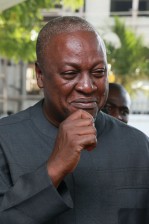
Ghana President John Dramani Mahama gestures as he speaks with election observers and ruling party members following a press conference at the presidential residence in Accra, Ghana, Sunday, Dec. 9, 2012. (AP Photo/Christian Thompson)
ACCRA—Ghana’s John Dramani Mahama, declared winner on Sunday of presidential elections, is a writer and devotee of Afrobeat music who just five months ago had no plans to be a candidate in the December 7 polls.
The 54-year-old former vice president was vaulted into the head of state job when his predecessor John Atta Mills died suddenly in July. Weeks later, the ruling National Democratic Congress (NDC) party named him its presidential flag bearer.
His rise to the presidency came the same year he published a memoir, “My First Coup d’Etat — And Other True Stories from the Lost Decades of Africa”, in which he says he was forever changed by his boyhood experiences during a 1966 military coup.
As the memoir makes clear, Mahama was born in northern Ghana as a child of privilege, his house being the only one in the village with a diesel generator, its well lit rooms attracting a nightly smattering of fascinated onlookers.
In the book’s first chapter, he vividly recalls the day in 1966 when he learnt Ghana’s founding president Kwame Nkrumah was ousted in a military coup.
“When I look back on my life it’s clear to me that this moment marked the awakening of my consciousness. It changed my life and influenced all the moments that followed,” he wrote.
His father, who served as junior minister in Nkrumah’s government, was briefly detained and interrogated by the coup leaders, but was later released unharmed.
Mahama has described 1966-1992, when Ghana was mostly led by military dictatorships, as “lost decades” from which the country is still emerging.
When asked by US National Public Radio earlier this year about the hardships of his youth under military rule in an impoverished country, Mahama recounted, among other challenges, how difficult it was for a young man to find a cold beer in a night club.
Ghana’s president has also written a series of pieces for The Root, a US online magazine directed at a black readership.
In one piece, he describes his love for Nigeria’s “Afrobeat legend” Fela Kuti, explaining that the iconic musician’s criticism of corruption and military brutality “gave us an outlet for our outrage and frustrations.
“He sang about what so many people felt but were not able to express for fear of the consequences.”
Before Mills tipped him for the vice presidency, Mahama was a member of parliament and chairman of the West Africa Caucus at the Pan African Parliament in Pretoria.
Some analysts had warned that his candidacy could have been weakened by its last-minute nature, with little time for Mahama to establish himself as the incumbent after Mills’s death.
But his face adorned posters around the country, and, according to Emmanuel Gyimah-Boadi, a political science professor at the University of Ghana, voters now seem fully acquainted with their new president.
“I think (he) has adequately and fully introduced himself to the country in all its nooks and crannies.”